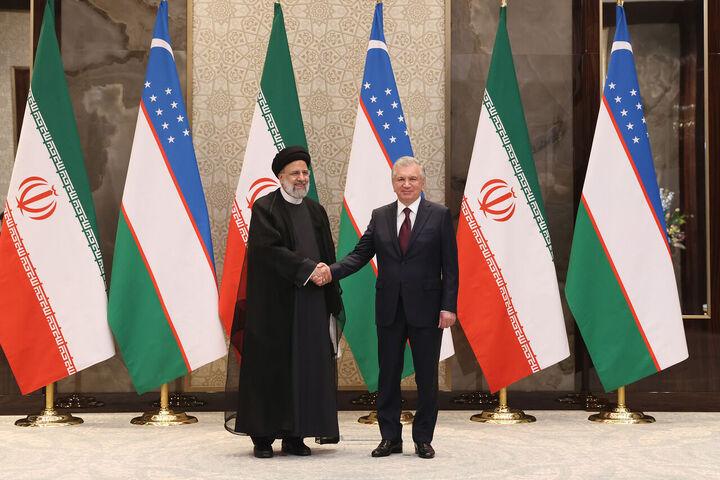Referring to the strategic position of Uzbekistan in the region, Omid Rahimi told the Strategic Council on Foreign Relations that Uzbekistan is geographically located in the heart of Central Asia and neighbors all four other Central Asian republics as well as Afghanistan, and this is considered a unique advantage in terms of geography.
“At the same time, geocultural features should be added to this specific geographical location due to the role and position of the Uzbek ethnicity in the entire Central Asia region. This situation has also caused Uzbekistan always to be central to important regional developments”.
Recalling that during the Soviet period, Tashkent was also the center of making important regional decisions, he added that today, due to the changes that have taken place in Uzbekistan since 2017, this country is also crucial in other ways. Deep and extensive reforms have taken place in this country, which has made Uzbekistan an inspiring model for development, open door policy, and especially reforms. A close relationship and partnership with a country that plays such a role in the Central Asian region and at the Eurasian level will naturally have many benefits.
This analyst of Central Asian issues, despite important areas such as security and stability in Afghanistan, called the “economy” the most important issue common between Tehran and Tashkent and said that the economy had been the main driver of bilateral interactions between Iran and Uzbekistan in recent years. The main goal of Uzbekistan’s reforms is economic development in the first place, and in this sense, economic and commercial relations are of key importance in the country’s foreign policy.
Rahimi stated that Iran wanted to draw up a roadmap for economic cooperation between the two countries. Recent trends also show that we have witnessed a growth and even a serious leap in the bilateral relations between Iran and Uzbekistan in recent years. In 1999, the total trade between the two countries reached 255 million dollars, which will increase to 503 million dollars in 2021, showing a 100% jump. Considering the complementary fields in the two countries economies, this capacity can be expanded up to 2 billion dollars in the short term, as mentioned in the recent Joint Economic Commission in Tashkent.
He pointed out that Uzbekistan is a producer and exporter of important and strategic products such as gold, various textiles, including cotton yarn and cloth, legumes, chemical industries, copper and various metals, automobiles, and many new industrial products that have a relatively large market in Iran.
He added that Iran could also supply part of Uzbekistan’s needs in illegal areas, including petrochemicals, horticultural and agricultural products, polymers and plastics, industrial machinery, and similar sectors.
According to Rahimi, if catalysts such as preferential trade agreements, transit agreements, monetary and financial exchanges, and other such things are activated through bilateral or multilateral mechanisms such as ECO, the Eurasian Economic Union, we can witness the development of available capacities given the observer membership of Uzbekistan and even Shanghai.
Referring to the developments related to the war in Ukraine and its profound effects, especially in the field of transit in Central Asia, this analyst of Central Asian issues explained the importance of the transit cooperation between Iran and Uzbekistan and added that regardless of political views and commercial exchanges, transit and geo-economy, in general, is an area that can improve the relations between Tehran and Tashkent to a strategic level. As a landlocked region, Uzbekistan is located in the heart of Central Asia, and access to open waters is strategically important for this country. For this reason, during the last five years, this country has initiated various transit projects, including the “Trans-Afghan” corridor, which connects Central Asia to Pakistan and the waters of the Indian Ocean through Afghanistan.
Rahimi emphasized that Iran has been one of the traditional and strategic routes for Uzbekistan to access international open waters, the markets of Persian Gulf countries, and West Asian countries such as Turkey and Iraq. After the start of the Ukraine war, the southern and western alternative routes gained double importance when the transit processes from Central Asia to Europe using Russian infrastructure faced problems.
He explained that Uzbekistan could also be one of the short routes for Iran’s rail and land access to China. The Uzbekistan-Kyrgyzstan-China rail corridor to Urumqi is being implemented with the agreement of the three countries. If it is completed, short access to China will be provided for Iran. However, like many other fields, this field still faces serious obstacles.
This expert on Central Asian issues, stating that the railway routes are still not connected to Chabahar, said that sometimes we see delays in various processes for Central Asian cargoes in the southern ports of Iran; there are occasionally some problems on the Turkmenistan railway route; and limitations in infrastructure such as rails, wagons, and trucks are still noticeable; and this has caused us to not witness the formation of a geo-economic interdependence despite the extensive interactions between Iran and Uzbekistan in the field of transit.
While referring to the upcoming visit of the President of Uzbekistan to Tehran and its goals, Rahimi noted that this is the first official visit of Mr. Shaukat Mirzayev, the President of Uzbekistan, to Tehran. In this sense, this visit is of great political importance.
“Many issues related to bilateral relations in the field of facilitating business processes, developing political consultations, strengthening strategic cooperation, drawing a roadmap for the development of relations between the two countries, as well as coordination for cooperation within the framework of various international organizations, are all areas that are discussed in the framework of such meetings and events related to it can be realized. With this trip and the finalization of a package of bilateral cooperation documents between the two countries, we can witness another leap in the commercial exchanges of the two countries for the next year”.










0 Comments